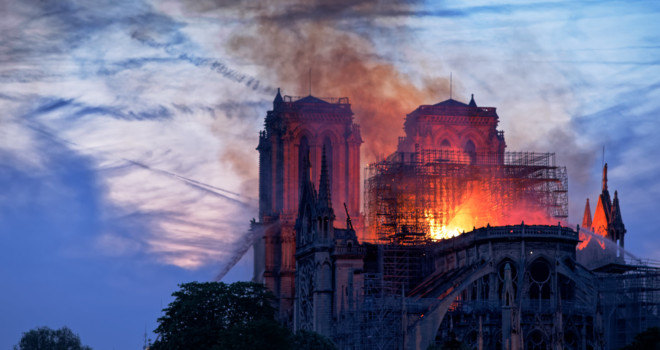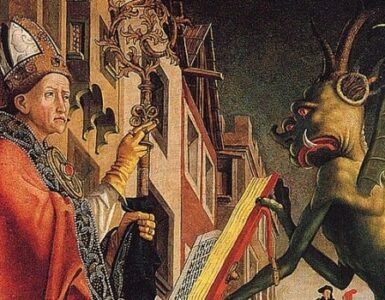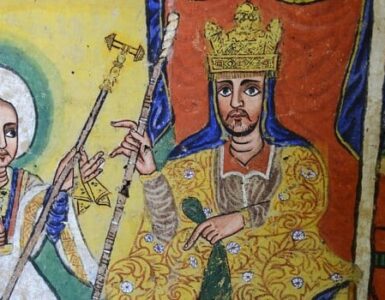Like St. Joan of Arc, Notre Dame de Paris — the Gothic icon of Catholicism on the Île de la Cité in the middle of the Seine — was ravaged by raging flames on April 15, 2019. As the roof blazed and the spire collapsed, the world watched in helpless sorrow. “So much of the culture and history and identity of France are embodied by Notre Dame,” French historian Bernard Lecomte said to the media. “We are looking at the heart of Paris burn.” And the Catholic Church’s heart burned with it. The precious relics of the Passion — the Holy Crown of Thorns, one of the Holy Nails, and a fragment of the True Cross — housed for centuries within this sacred bastion of Catholic culture will not be venerated within its walls for many Good Fridays to come. It is these terrible and even infernal moments that challenge the soul with the mystery of peace.
Though the pain of the Notre Dame fire, and its painful image of the Church in flame, can be a deterrent from trusting blindly in God’s will, it is a test to accept that, even in permitting catastrophe, God can and will bring about the good. He will not let His Church perish in flame.
To all whose eyes, minds, and hearts are open, the universe clearly bespeaks the action of a God of love and life — a benevolent Being Who is good and Whose goodness is reflected in the works of charity. This is the God of the Christian West and the Catholic Church, of which the Cathedral of Notre Dame de Paris was a symbol and center. It also represents the transcendence and constancy of the Church through tumultuous and traumatic times in history, from marauding Huguenots, to the French Revolution, to World War II.
Suffering & Trust
St. Thérèse of Lisieux said that, though God permits suffering, He does not permit suffering unnecessarily. These words of simple, saintly wisdom present both the crux and the consolation in days of fire, as France struggles with political tensions and a Church engulfed in the sexual abuse controversy.
When it comes to the scope of all things, the vision of man can barely be called a vision at all. It is weak and shortsighted. It is obscured and obstructed. In his blindness, man must cling with faith to God’s vision, which is the only vision that matters, for it is God Who directs the course of things, comprehending calamity for what it is and for what it can affect.
This trust, together with the trust that Our Lord will not leave His children to face alone what He permits, is the wellspring of peace in troubled times. All men and women, all Christians especially, have recourse to God’s presence and His peace. The smoke that hangs over France is dark indeed, but it invites a renewed belief that there is light and that, with God’s help, it will break through if the darkness is resisted.
God allows grief to occur, and so it behooves the faithful to gather their strength from God in accepting it. This is one of the greatest tests of Catholicism in a world consumed in fire. It is the trial of the Cross. It is the call to find conviction that God is all-sufficient even when gripped in sorrow. And, more importantly, that He can channel any suffering, any pain, any tragedy, any terror to good purpose. This is the faith, the trust, which grants peace—even when the Church herself is on fire. But the ability to find peace in the cacophony leads on to the state of unshakable faith that thrives merely in the promise of resurrection without any certitude that human reason knows. Hell has been defeated already. All men need do is participate in the victory, in the peace which passeth understanding.
It
is in times of calamity that the mystery of life becomes poignant and precious.
One of those mysteries, one of the deepest, is the problem of evil. In times
like these, the attempts to reconcile the problem of evil seem so futile and
frustrating to hearts in pain. When society has been lashed so sorely, it is
hard to find assuagement in philosophy. Even the theological truth that God
does not directly cause evil does not stop people from finding fault with God. But
tragedies like the burning of Notre Dame offer Christians the chance and the
grace to embrace the peace afforded by placing all things in the hands of God.
Just as one cannot have hope without hesitation, or fortitude without fear,
there can be no trust without some degree of devastation and loss. If there is
no sense of human abandonment, there can be no Divine abandon. If there is no
sense of powerlessness, then there is no point in
Providence.
As France and the whole world pauses in shock and horror at the burning heart of Paris, all are drawn to embrace the contradiction of the senses and to proclaim that God is love and that His Church will endure. This is where faith must act, where peace must find its foothold in the soul. Man’s wisdom will never know God’s wisdom; why He chooses to act and to allow as He does. Man will never understand the problem of evil—and that inability to understand is a blessing, even if it is a blessing in disguise. Without this ignorance, how could man follow his Father with the pure trust of a child and allow God to work His wisdom freely in the lives of men? What confidence can there be when there is consciousness? What peace can man enjoy without the pain of pandemonium?
St. Denis, patron saint of France, was beheaded in Paris and walked with his head in his hands to show the power of life over death. May he be with France and all Catholics this Holy Week when it seems the whole world has lost its head and as the fires seem to rise higher around the Church.
The heart of Paris has fallen in fire, and Catholics are heartbroken. In the end, such blows like the destruction of Notre Dame Cathedral are beyond rationalization—but this does not mean that they do not occur without reason. No matter how shattered and shaken Catholics might feel in the wake of such inexpressible, inconceivable loss, human perplexity cannot overthrow the truth that God is a loving God Whose providence is guided by Divine love. This can never be gainsaid by the destructive powers of chaos and calamity. Though they may seem to argue against the providence of God, nothing can disprove the existence of the infinite Good, the infinite God.
That mankind cannot prevent or abolish all evils does not dismantle this tenet of faith. It remains as constant as the sun in a sky of clouds. Its life and power are always there even when obscured. It can never be diminished or destroyed. And in that presence is peace.
We look to the resurrection, and we pray, to the rise of Notre Dame from the ashes.
✠
image: Notre-Dame de Paris, by Olivier Mabelly via Flickr (CC BY-NC 2.0)












